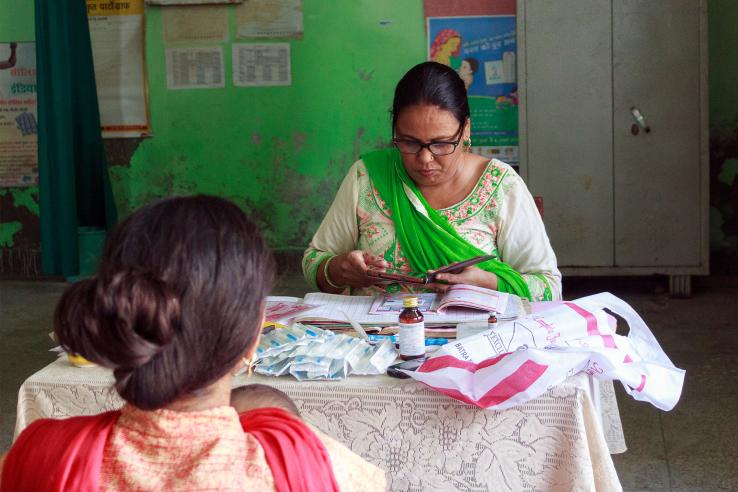February 2018 Newsletter

Putting data and evidence into practice: Insights from J-PAL's government partnerships
Every day, governments reach billions of people with critical public services. How can we support them in using evidence to drive innovation and increase effectiveness? J-PAL’s Government Partnership Initiative was launched in 2015 to do just that. After two years and 28 partnerships between governments and researchers in fifteen countries, we’re sharing some of our successes and challenges on the J-PAL blog.
In our first post, we explore how Chile, India, Peru, and Zambia are scaling up evidence-informed policies or building improved systems for evidence use. In our second post, we offer practical insights on ways to put evidence into practice in government policy. Learn more »
J-PAL North America launches education technology competition
Amid significant spending on education technology, there is growing demand for rigorous evidence on which technologies truly help students learn. J-PAL North America’s new Education, Technology, and Opportunity Innovation Competition invites US education agencies, school networks, post-secondary institutions, and nonprofits to partner with J-PAL to evaluate their most promising technology-based education programs, particularly those aimed at improving learning for disadvantaged students. Applications are due on April 13. Join us for a webinar on february 26 at 2 p.m. ET staff will introduce the competition provide an overview of application process and answer questions. Learn more »
EVIDENCE-INFORMED DECISION-MAKING
The impacts of networking on business performance in China
Can facilitating relationships between small- and medium-sized businesses help them grow? In Jiangxi Province, China, J-PAL affiliated professor Jing Cai (University of Maryland) and Ádám Szeidl conducted a randomized evaluation to study the impact of business relationships on firm performance. Monthly meetings among firms increased sales, profits, and other business outcomes, mainly by facilitating learning and partnership development. Based on these results, the government department in charge of private sector development scaled up the program to an additional 5,000 firms. Learn more »
FEATURED AFFILIATED PROFESSOR
Including young men in conversations about sexual health: A Q&A with Manisha Shah
J-PAL affiliated professor Manisha Shah (University of California, Los Angeles) studies interventions that seek to slow the transmission of HIV/AIDS and other sexually transmitted infections. In our interview, she describes her work in Tanzania on improving female sexual and reproductive health (SRH) outcomes. “Family planning and SRH programs tend to focus on women and girls, but most decisions related to sexual behavior involve men and boys, too. The idea is to test whether female SRH outcomes fare better in communities where we are also talking to the adolescent males.” Learn more »
Featured Multimedia
J-PAL South Asia at Ten
At J-PAL South Asia’s tenth anniversary event, J-PAL Director Abhijit Banerjee (MIT) celebrated the long-term partnerships that have led to new insights and knowledge for both organizations. From early work with Seva Mandir and Pratham to evaluate education interventions to the more recent partnership with the Government of Tamil Nadu, J-PAL South Asia has engaged closely with organizations to help them refine their approach and scale up their most effective programs. Watch the videos »
Upcoming Courses
This week: MicroMasters semester begins
The next semester of the J-PAL/MITx online MicroMasters in Data, Economics, and Development Policy begins Tuesday, February 6. Course offerings include Microeconomics, The Challenges of Global Poverty, Data Analysis for Social Scientists, Foundations of Development Policy, and Designing and Running Randomized Evaluations. Learners who complete the MicroMasters will be eligible to apply for an accelerated master’s degree program at MIT. Enroll now »
March 8–9 in Lima, Peru: Introduction to evaluation for social innovators
Innovations for Poverty Action, Universidad del Pacífico, and J-PAL Latin America & the Caribbean will host a two-day introductory workshop for social entrepreneurs and professionals working in corporate social responsibility (CSR). This workshop will equip participants with tools to integrate scientific evidence into social innovations and CSR initiatives. The course will be delivered in Spanish.
MEDIA HIGHLIGHTS
NYC touts success of court-appearance reminder texts
Courthouse News
Text-based tips may help parents and preschoolers learn
Hechinger Report
Using a massive open online course (MOOC) to build a culture of evidence in Brazil
J-PAL Blog
Celebrating Chile's inaugural Giving Tuesday with Dean Karlan
J-PAL Blog
Why economists should think like plumbers: An interview with Esther Duflo
INSEAD Knowledge
NEW RESEARCH PAPERS
Governance and the Effectiveness of Public Health Subsidies: Evidence from Ghana, Kenya and Uganda
Rebecca Dizon-Ross, Pascaline Dupas, and Jonathan Robinson
Announcements of Support and Public Good Provision
Judd B. Kessler
Environmental Externalities and Free-riding in the Household
Kelsey Jack, Seema Jayachandran, and Sarojini Rao
Diffusion of Agricultural Information within Social Networks: Evidence on Gender Inequalities from Mali
Lori Beaman and Andrew Dillon
Increasing Perseverance in Math: Evidence from a Field Experiment in Norway
Eric Bettinger, Sten Ludvigsen, Mari Rege, Ingeborg F. Solli, and David Yeager
Featured Jobs
Executive Director, J-PAL Latin America & the Caribbean (Santiago, Chile)
Training Manager, J-PAL Global (Cambridge, MA, US)
Research and Training Associate, J-PAL Global (Cambridge, MA, US)
Policy Manager (Health), J-PAL Global (Cambridge, MA, US)
Senior Policy Associate (Health), J-PAL Global (Cambridge, MA, US)
Policy and Communications Manager, J-PAL North America (Cambridge, MA, US)
Policy and Communications Associate, J-PAL North America (Cambridge, MA, US)
Explore open positions around the world »
PLEASE SHARE YOUR FEEDBACK
Take a short anonymous survey to help the J-PAL newsletter team assess how the newsletter can better serve your interests. The survey should take no more than five minutes to complete.